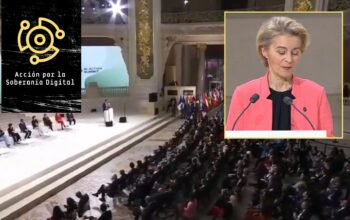Un borrador filtrado de la declaración que los países firmarán en la Cumbre de Acción sobre Inteligencia Artificial de París la próxima semana revela muchas palabras de moda y pocas acciones concretas.
Aunque la declaración final puede diferir con el documento filtrado, titulado «Declaración sobre inteligencia artificial inclusiva y sostenible para las personas y el planeta», los expertos consideran que no tendrá cambios sustanciales. Entre los aspectos destacables, este documento preliminar no establece compromisos tangibles ni una hoja de ruta clara para abordar los riesgos de la IA, lo que parece confirmar los temores de que la cumbre será una oportunidad perdida para reforzar la seguridad en este ámbito.
Shakeel Hashim, periodista que filtró el documento, criticó la falta de medidas concretas, mientras que Herbie Bradley, ex empleado del Instituto de Seguridad de IA del Reino Unido, señaló que el borrador “no dice prácticamente nada más que lugares comunes” y carece de sustancia en cuanto a la investigación técnica y las pruebas gubernamentales sobre IA.
El documento concentra la gobernanza de la IA en una Plataforma e Incubadora de IA de Interés Público que centralizaría acciones y delimitaciones regulatorias, pues abiertamente apuesta por combatir lo que se interpreta como «fragmentación entre las iniciativas públicas y privadas». Aunque menciona la necesidad de permitir el desarrollo de la IA en países emergentes, en la práctica no aboga por su autonomía y soberanía digital, sino que únicamente reconoce su derecho de acceso sin precisar que se garantizará su capacidad de autorregulación.
Además, muchos de los puntos abogan por bloquear la concentración de poder de las corporaciones tecnológicas mediante organismos internacionales, pero con un enfoque globalista que podría resultar en una mayor injerencia en países en desarrollo. Se menciona la construcción de un ecosistema de IA confiable con igualdad de derechos e implicaciones para todos los actores, algo que en la práctica no se cumple, ya que los países hegemónicos continúan dictando las normas regulatorias.
En este sentido, el interés público que menciona la declaración parece configurarse bajo un marco de capital social homogéneo donde todos tienen el mismo nivel de participación, lo que en realidad permitiría intervenciones en países con menor poder regulatorio bajo la bandera de un «interés público» ambiguo y vago.
Documento filtrado
AI Action Summit
Co-chaired by France and India
10-11 February, 2025, Paris
Statement on Inclusive and Sustainable Artificial Intelligence for People and the Planet
- Participants from XX countries, including government leaders, international organisations, representatives of civil society, the private sector, and the academic and research communities gathered in Paris on 10 and 11 February 2025 to hold the AI Action Summit. Rapid development of AI technologies represents a major paradigm shift, impacting our citizens, and societies in many ways. In line with the Paris Pact for People and the Planet, and the principles that countries must have ownership of their transition strategies, we have identified priorities and launched concrete actions to advance the public interest and to bridge digital divides through accelerating progress towards the SDGs. Our actions are grounded in three main principles of science, solutions – focusing on open AI models in compliance with countries frameworks – and policy standards, in line with international frameworks.
- This Summit has highlighted the importance of reinforcing the diversity of the AI ecosystem. It has laid an open, multi-stakeholder and inclusive approach that will enable AI to be human rights based, human-centric, ethical, safe, secure and trustworthy while also stressing the need and urgency to narrow the inequalities and assist developing countries in artificial intelligence capacity-building so they can build AI capacities.
- Acknowledging existing multilateral initiatives on AI, including the United Nations General Assembly Resolutions, the Global Digital Compact, the UNESCO Recommendation on Ethics of AI, the African Union Continental AI Strategy, and the works of the Organization for Economic Cooperation and Development (OECD), the council of Europe and European Union, the G7 including the Hiroshima AI Process and G20, we have affirmed the following main priorities:
- Promoting AI accessibility to reduce digital divides;
- Ensuring AI is open, inclusive, transparent, ethical, safe, secure and trustworthy, taking into account international frameworks for all
- Making innovation in AI thrive by enabling conditions for its development and avoiding market concentration driving industrial recovery and development
- Encouraging AI deployment that positively shapes the future of work and labour markets and delivers opportunity for sustainable growth
- Making AI sustainable for people and the planet
- Reinforcing international cooperation to promote coordination in international governance
To deliver on these priorities:
- Founding members have launched a major Public Interest AI Platform and Incubator, to support, amplify, decrease fragmentation between existing public and private initiatives on Public Interest AI and address digital divides. The Public interest AI Initiative will sustain and support digital public goods and technical assistance and capacity building projects in data, model development, openness and transparency, audit, compute, talent, financing and collaboration to support and co-create a trustworthy AI ecosystem advancing the public interest of all, for all and by all.
- We have discussed, at a Summit for the first time and in a multi-stakeholder format, issues related to AI and energy. This discussion has led to sharing knowledge to foster investments for sustainable AI systems (hardware, infrastructure, models), to promoting an international discussion on AI and environment, to welcoming an observatory on the energy impact of AI with the International Energy Agency, to showcasing energy-friendly AI innovation.
- We recognize the need to enhance our shared knowledge on the impacts of AI in the job market, though the creation of network of Observatories, to better anticipate AI implications for workplaces, training and education and to use AI to foster productivity, skill development, quality and working conditions and social dialogue.
- We recognize the need for inclusive multistakeholder dialogues and cooperation on AI governance. We underline the need for a global reflection integrating inter alia questions of safety, sustainable development, innovation, respect of international laws including humanitarian law and human rights law and the protection of human rights, gender equality, linguistic diversity, protection of consumers and of intellectual property rights. We take notes of efforts and discussions related to international fora where AI governance is examined. As outlined in the Global Digital Compact adopted by the UN General Assembly, participants also reaffirmed their commitment to initiate a Global Dialogue on AI governance and the Independent International Scientific Panel on AI and to align on-going governance efforts, ensuring complementarity and avoiding duplication.
- Harnessing the benefits of AI technologies to support our economies and societies depends on advancing Trust and Safety. We commend the role of the Bletchley Park AI Safety Summit and Seoul Summits that have been essential in progressing international cooperation on AI safety and we note the voluntary commitments launched there. We will keep addressing the risks of AI to information integrity and continue the work on AI transparency.
- We look forward to next AI milestones such as the Kigali Summit, the 3rd Global Forum on the Ethics of AI hosted by Thailand and UNESCO, the 2025 World AI Conference and the AI for Good Global Summit 2025 to follow up on our commitments and continue to take concrete actions aligned with a sustainable and inclusive AI.




